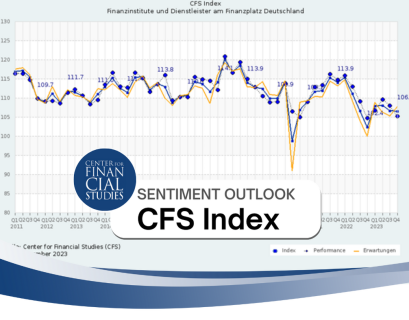Börsen-Zeitung, 28 January 2023
The German Association for Financial Analysis and Asset Management (DVFA) claims to make a decisive contribution to translating the regulatory requirements for an environmentally friendly, social economy organised according to rules of good corporate governance into the investment process. DVFA is an essential transmission belt to ensure that ESG requirements find their way into the day-to-day work of the financial industry”, emphasise Thorsten Müller, Chairman of the Board of DVFA, and Vice Chairman Ingo R. Mainert.
The two board members refer to the independent, internationally networked Finance Academy of the association. We have certified more than 400 ESG specialists in the past three years,” reports Müller. Mainert explains that the composition of the board is an example of the great role ESG (Environmental, Social, Governance) now plays in the capital markets. With Prof. Christina Bannier, Michael Schmidt and Ingo Speich, “three of the most prominent representatives of the topic of ESG in the financial centre are represented on the DVFA’s executive committee.
In addition to the sustainable transformation, digitalisation also has an influence on the professional profile of investment professionals – the group that the DVFA sees itself as representing. The investment professional has long since ceased to be limited to analysts, and certainly not to equity analysts,” emphasises Mainert.
Broader membership base
In the past, DVFA was an association with a focus on financial analysts, Müller recalls. In recent years, however, many jobs have been cut in financial analysis, also due to the requirements of the EU market directive Mifid II and the use of artificial intelligence. At the same time, the association has broadened its orientation and thus its membership base – across the entire value chain in the investment process, “from specialists in the primary market to research and sales, from asset managers to back office and ESG specialists”, Müller explains and adds: “Today, we also have members who are intensively involved with the application of blockchain in the financial industry.”
The association is responding to this by, among other things, founding a specialist committee on digital assets and blockchain – or by offering the Chartered Financial Data Scientist (CFDS). This focuses strongly on the increasingly important topics of data quality and artificial intelligence,” Mainert explains – and is thus a way to address younger colleagues in the financial industry and to open up a new field of activity for the DVFA in the financial industry.
Access also for small firms
Müller and Mainert explicitly emphasise that DVFA also represents the interests of small market participants. We advocate that the capital market should not only function for large participants. It must not be the case that today it is much easier to issue 1 billion euros in Germany than 20 million euros”, Müller emphasises. The DVFA is definitely concerned about the access of small and medium-sized companies to the capital market and about their liquidity on the market. Some listed companies are hardly investable any more because they do not meet the high liquidity requirements and ESG data are not yet available. These companies are thus being systematically sold out,” Müller complains. The financial centre and the regulators therefore need to think about making the regulatory framework a little broader and more generous for smaller and medium-sized companies and less burdensome for them. This will be a topic that DVFA will look at intensively in the next two years’, announces the DVFA Chairman.
Müller illustrates his concerns with the example of a medium-sized company that is well managed and has an external BB rating. Some investors refused to invest in this company because they only invested in companies with at least BBB. ”If the SME had not had an external rating, the investor would have had the chance to come to a different conclusion in the course of an internal investment rating process”, namely that it was a successful niche player that the in-house rating systems had rated BBB, so that the investor could have become involved. In this case, the transparency of an external rating has a counterproductive effect – “this is completely paradoxical from a financial analysis point of view”, Müller sums up. Mainert adds: “The risk that at some point no information at all will be made available in research for small and medium-sized market participants is high”.
Regulation in view
DVFA continues to be actively involved in consultations on regulatory topics. The opinion of the association is valued because the DVFA unites different perspectives of market participants. We are neither only sell side nor only buy side, we are neither representatives of the small nor only of the big market participants, but a mixture of investment professionals across the board”. Müller recalls that the proposal – also put forward by the DVFA – was taken up in the course of the Mifid consultations to allow bundling (remuneration of research via sales commissions) again up to a market capitalisation of €1 billion.
In addition to participating in the regulatory debate, the establishment of standards is still a very important focus – “whether historically the ‘good old’ earnings per share according to DVFA, the principles for financial research, the DVFA Code of Conduct, the topic of fairness opinions or the Corporate Governance Scorecard.
The association wants to be a network in which arguments are exchanged and guidelines and standards are developed, also in order to avoid that the legislator has to regulate at all. The association, which has had a stable membership base of around 1400 investment professionals for several years, can well imagine “entering into cooperations with other associations that identify centrally with the topic of responsibility in the capital market”, says Müller. After all, DVFA has to try to achieve the greatest possible impact with limited resources. We are experiencing the trend that the capital market is moving more into the socio-political field of vision’, says Mainert. Whether in old-age provision or in the fight against climate change, the capital market is increasingly perceived as an important element of political solutions in the sense of a kind of public-private partnership. We are noticing this, for example, in the discussions about and for an equity pension.
Text: Börsen-Zeitung, issue 20 of 28.01.2023, page 11 (secondary publication right).
Image: Jan-Philipp Thiele via Unsplash





